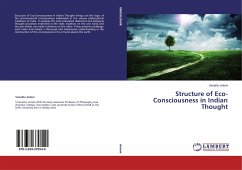
Philosophy Of Indian Religions: Ethics And Values
Versandkostenfrei!
Versandfertig in 6-10 Tagen
51,99 €
inkl. MwSt.

PAYBACK Punkte
26 °P sammeln!
Ethics, which is a major branch of philosophy, encompasses right conduct and good life. It is significantly broader than the common conception of analyzing right and wrong. A central aspect of ethics is "the good life", the life worth living or life that is simply satisfying, which is held by many philosophers to be more important than traditional moral conduct. Many reasons can be offered for the employment of ethics and values in life. Ethical life with values is more likely to produce a constructive outcome. Ethics is consistent with the teachings of the major religions. Ethics can also be ...
Ethics, which is a major branch of philosophy, encompasses right conduct and good life. It is significantly broader than the common conception of analyzing right and wrong. A central aspect of ethics is "the good life", the life worth living or life that is simply satisfying, which is held by many philosophers to be more important than traditional moral conduct. Many reasons can be offered for the employment of ethics and values in life. Ethical life with values is more likely to produce a constructive outcome. Ethics is consistent with the teachings of the major religions. Ethics can also be the basis for a way of life. It is consistent with a belief in the underlying unity of human mankind. In this book an effort is made to present how far ethics and values would be accepted as a way of life with reference to different religious practices, applied in different religions like Hinduism, Buddhism, Jainism, Christianity and Islam in India and an attempt is also made to bring out some distinct views of Contemporary Indian Thinkers like Gandhi, Vivekananda and Dr. Sarvepalli Radhakrishan on ethical values.












